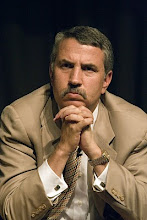Confession: I’m burnt out on Tom Friedman. I hardly ever
read him any more, having digested the five columns he lazily recycles over and
over far more times than is necessary to get the point or mock. I’m also tired
of Friedman jokes, which also suffer from the same problem of being really
repetitive -- cabdriver! Even worse, by focusing on his mangled metaphors and stupidity, Friedman’s critics tend to reduce Tommy to a harmless, bumbling
caricature, which obscures the fact that, while he is most certainly a bumbler
and a caricature, he’s actually been a very effective evangelist for
imperialism.
Nevertheless! When I was asked to review Barrett Brown’s
chapter on Friedman from his new book Keep Rootin' for Putin: EstablishmentPundits and the Twilight of American Competence, I leapt at the chance. For
one, I’m a huge admirer of Brown, the investigative journalist and founder of
Project PM, who has been imprisoned for 18 months and faces up to 70 years for
the most ludicrous charges. If this review makes my 4 readers more aware of
Brown’s plight or gets them to buy a book, the proceeds of which go to his
defense fund, great! But the main reason I was so excited was that I would
literally read Brown on anything, even boring old Tom Friedman. (If you haven’t
been reading the series “The
Barrett Brown Review of Arts and Letters and Jail,” put this “review” on
hold and go do so.)
Brown doesn’t disappoint. His chapter belongs in the
pantheon of great Friedman takedowns, alongside Matt Tiabbi, Belen Fernandez,
and the Greenwash Guerrillas who pied The Stache. As always, Brown is a pleasure
to read – his unique voice, comic detours, and impeccable timing had me laughing
throughout the chapter. It also helps that many of the columns Brown skewers are not the usual ones we’ve come to associate with Friedman’s
horribleness.
Take the 2001 column from which Brown gets the book’s title,
a cringe-inducing paean to Vladimir Putin written after Friedman flies to
Moscow and is blown away by the fact that one can get sushi there (“yes, from
borscht to Big Macs to California-Kremlin rolls in one decade!”) He concludes
-- based on this observation, another meal at “a combination art
gallery-restaurant” and a conversation with his “Russian friend Viktor” -- that
Putinism is a good thing. The column ends – seriously – with an exhortation to “keep
rootin’ for Putin.”
Putin, Brown points out, was the former head of the FSB when agents were caught red-handed planting explosives in Moscow which they planned to blame on Chechen
terrorists. Brown details how questionable attribution of other attacks in Russia was used as the pretext to invade Chechnya and
how those who questioned whether the FSB might actually be the terrorists were
strong-armed and undermined with dirty tricks. The war on Chechnya proved
so popular with Russians that Putin, its champion and architect, easily won the
presidency. All of this might have been cause for alarm for Friedman in 2001,
but what’s war and manufactured terror attacks compared to the novelty of a “California-Kremlin
roll.”
In Friedman’s defense, it’s possible his praise for Putin wasn’t
genuine and the entire column was just filler because he thought “rootin’ for
Putin” was really clever. One of my favorite passages in Brown’s chapter is
when he destroys a column that’s constructed entirely around the fact
that Friedman decides to call Colin Powell's military service America OnDuty just so he can
contrast it with America Online. This allows Friedman to muse:
He spent thirty-five years of his life with America Onduty, as a military officer. But for the past two years he’s been associated with America Online, as a member of the AOL corporate board. So which perspective will Mr. Powell bring to his job as Secretary of State—the perspective he gleaned with America Onduty during the cold war or the perspective he gleaned with America Online in the post-Cold War?
Suffice to say, Brown has fun with this idiocy.
But back to Russia.
It’s now 2008, Russia has invaded Georgia, and Friedman is no longer a Putin man. In fact, he’s so disgusted
by Vladimir
that he calls out those – like the Bush and Clinton administrations – who
were guilty of “short-sightedness” with regards to Putin. Of course, there’s no
mention of Friedman’s own Putin vision problem. Being a pundit means never
having to say your sorry, or even being aware or honest about what you once
said. (One of Friedman’s most frequent lies about himself is that he called for
$1/gallon gas tax on September 12, 2011. In fact, he called for Muslim heads. He
didn’t float his gas tax idea until October 5, 2003 – when the two wars he
cheerled were well under way.)
Brown is a joy to read as a media critic and he expertly
fillets a number of other Friedman columns. But its not just talent that sets Brown apart from the other
4,303,301,087 people doing media criticism on the Internet and Twitter. Brown wants to level our pundits not because he wants to replace them with
better pundits (there’s no throat-clearing and pointing to himself here), but
because he wants to do away with pundits altogether. And pundits need to be slayed
not just because their stupid and wrong and always on the side of power, but because
the Internet, through things like access to direct material and crowd-sourcing,
offers a real and better alternative to our pathetic punditocracy. There’s poignancy
in reading Brown's book knowing that he faces life in prison for acting on these
ideals.
And then, of course, there’s the fact that while Barrett
Brown faces life in a cage, the man he utterly obliterates in Rootin' for Putin lives here:
Free Barrett Brown.
And Fire Tom Friedman.

.jpg)
No comments:
Post a Comment